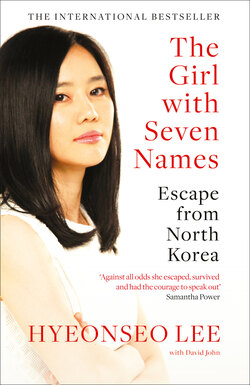Читать книгу The Girl with Seven Names - Hyeonseo Lee - Страница 9
Prologue
ОглавлениеI was awoken by my mother’s cry. Min-ho, my kid brother, was still asleep on the floor next to me. The next thing I knew our father came crashing into the room, yelling ‘Wake up!’ He yanked us up by our arms and herded us, pushed us, out of the room. My mother was behind him, shrieking. It was evening and almost dark. The sky was clear. Min-ho was dazed from sleep. Outside on the street we turned and saw oily black smoke pouring from our kitchen window and dark flames licking the outside wall.
To my astonishment, my father was running back into the house.
A strange roar, a wind rushing inward, swept past us. We heard a whumpf. The tiles on one side of the roof collapsed, and a fireball like a bright orange chrysanthemum rose into the sky, illuminating the street. One side of the house was ablaze. Thick, tar-black smoke was belching from the other windows.
Where was my father?
Our neighbours were suddenly all around us. Someone was throwing a bucket of water – as if that would quench this blaze. We heard the groan and splitting of wood and then the rest of the roof went up in flames.
I wasn’t crying. I wasn’t even breathing. My father wasn’t coming out of the house.
It must only have been seconds but it seemed like minutes. He emerged, running toward us, coughing his lungs up. He was blackened by smoke, his face glistening. Under each arm he was holding two flat, rectangular objects.
He wasn’t thinking of our possessions, or our savings. He’d rescued the portraits. I was thirteen, old enough to understand what was at stake.
Later my mother explained what had happened. Some soldiers had given my father a large can of aviation fuel as a bribe. The can was in the kitchen, which was where we had an iron stove that burned yontan – the circular charcoal cakes used for heating everywhere in North Korea. She was in the act of decanting the fuel into another container when it slipped from her hands and splashed onto the coals. The combustion was explosive. The neighbours must have wondered what on earth she’d been cooking.
A wall of intense heat was advancing from the blaze. Min-ho began to wail. I was holding our mother’s hand. My father put the portraits down with great care, then hugged the three of us – a public display of affection that was rare between my parents.
Huddled together, watching the remains of our home collapse in a rippling glow, the neighbours might have felt sorry for us. My father looked a sight – his face was filthy and his new civilian suit ruined. And my mother, who was house-proud and always made an effort to dress nicely, was seeing her best bowls and clothes go up in smoke.
Yet what struck me most was that neither of my parents seemed that upset. Our home was just a low, two-room house with state-issue furniture, common in North Korea. It’s hard to imagine now how anyone would have missed it. But my parents’ reaction made a strong impression on me. The four of us were together and safe – that was all that mattered to them.
This is when I understood that we can do without almost anything – our home, even our country. But we will never do without other people, and we will never do without family.
The whole street had seen my father save the portraits, an act of heroism that would win a citizen an official commendation. As it turned out, matters had gone too far for that. We did not know it, but he was already under surveillance.
